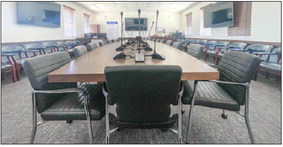Board approves 2025 budget
GRF BOARD RECAP
by Ruth Osborn
Communications Director
The GRF Board of Directors approved a $27-million budget that includes a $234.97 assessment per apartment per month, up $21.72 from 2024.
The assessment increase is largely attributable to historically high insurance costs and anticipated hikes in employment costs from a probable mandated minimum wage hike to $18 per hour.
The vote came at the end of a raucous meeting Oct. 30 in Clubhouse 4. About 50 people sat in the audience cheering on the 14 residents who spoke at the podium. Most of them voiced displeasure over the assessment increase, decrying “out-of-control” spending, and a lack of transparency and fiscal responsibility.
The board answered residents as succinctly as possible.
• 2025 spending projections are only 1.97% higher than the 2024 budget once the unprecedented and immutable insurance increase is excluded. The local consumer price index is 4.1%, meaning that the budget is well below the index.
•Budget deliberations started in late summer and went through two rounds of scrutiny by five GRF committees, this after all departments spent weeks pondering spending projections. All committee meetings were open to the public.
• The GRF demonstrated fiscal prudence on several levels, most importantly by ensuring passage of a budget in a timely manner to meet civil code deadlines. If a budget had not been approved by Oct. 31, revenue would have been lost, cash flow reduced and paying for mandatory operating expenses such as insurance would have been hindered.
The board first considered the budget at a meeting Oct. 24, but directors failed to find consensus after several votes, two of them tied.
GRF President Janet Isom then continued the meeting until Oct. 30. In the intervening time, GRF Executive Director Jessica Sedgwick and Executive Manager of Mutual Services Dave Potter made further cuts, including reducing the staffing budget by about $200,000 by removing positions already vacant that will not be filled from the 2025 budget. Further cuts were made to meals and special events from $30,000 to $15,000; and GRF board office supplies from $4,000 to 0.
The additional budget cuts made after the Oct. 24 meeting don’t significantly offset the real driver of the budget increases approved at the Oct. 30 meeting, which are the higher insurance costs.
The 2025 approved budget sets the insurance premium for 2025 at $2.7 million, an increase from the $933,000 budgeted for 2024. The GRF’s cash position has been reduced by the deficit created by the insurance premium increase for 2024, and this impacts its ability to pay the premium for 2025 while maintaining the necessary liquidity to “float” charges billed to Mutuals without the approved increase for 2025.
The 2025 budget also redirects capital funding to help accrue the necessary cash balance to pay the insurance premium going forward. This means that capital fund expenditures in 2025 will be limited to life-and-safety and liability-reducing expenditures, since there are no replenishments for spending from capital in 2025.
The budget includes a freeze on new staff positions and automatic reviews of all vacated positions to ascertain if they can be cut or reconfigured. The board will also undertake a benchmarking project, which entails comparing GRF company performance against the performance of others and industry best practices.
Assessments will generate about $18.6 million in revenue in 2025, and other revenue sources (including revenue from leases, Trust Property Use Fees, newspaper advertising, and other sources) will generate about $8.8 million; 67% of the GRF’s expenses are covered by assessments, with the remaining third being paid for by other revenue.
The 2025 budget calls for a freeze on all new staff positions and automatic reviews of all vacated positions to ascertain if they can be cut or reconfigured.





